The term ‘underrated’ has been quite abused and overused over the years, but it quite specifically means that certain performance artists haven’t gotten the attention (in numbers) they should have gotten. Most of them have found their niche and are relatively successful and happy with their own careers, and maybe they’ve found enough cinema enthusiasts who have taken notice of their talent, but in a country like ours, there’s always room for more.
It’s always nice to have them around to set the standards – whether in mainstream or independent cinema – and to be assured that they’re always, forever fighting the good fight – for their sake, and for our collective sakes.
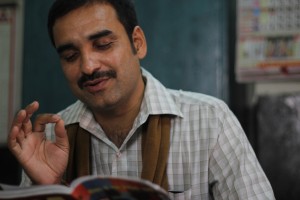
PANKAJ TRIPATHI
Twice in 2016 already, the soft-spoken and chameleon-like Tripathi has stepped out of his films’ shadows and has become the one thing most viewers take away from them. In the inconsistent and choppy ‘Global Baba’, he stood out as the lisping fraud-sage sidekick to Abhimanyu Singh’s titular character, and then won every generations of childhood memories as the eccentric primary-school principal Mr. Srivastava in the sweet ‘Nil Battey Sannata.’ As the kids’ memorable 10th grade math teacher, Tripathi dazzled with his deliberate touches of sarcasm and ‘performance art’ — much like how most teachers essentially play the roles of different kinds of disciplinarians in school corridors. From his Bihar-theatre and NSD days to his murderous and famed turns as Sultan Qureshi in Anurag Kashyap’s ‘Gangs Of Wasseypur’ series, Tripathi even tried his hand at full-blown mainstream cinema in Rohit Shetty’s Dilwale last year. He was the standout as Richa Chaddha’s shy and sheltered colleague Satya-ji in Neeraj Ghaywan’s award-winning ‘Masaan’, too. What is evident from all this is that Tripathi is willing to experiment and never sell himself short — an attribute we look forward to exploring further as he perhaps turns into Hindi cinema’s most popular faces.
SAURABH SHUKLA
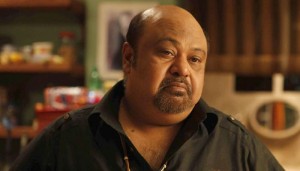 Many ‘90s fans will have noticed a distinct and heavy figure in many path-breaking (parallel, sort of) Indian films of that decade. From Sudhir Mishra’s Iss Raat Ki Subah Nahi (his second role after ‘Bandit Queen’) to being the immortal (ear-wormy) Kallu Mama in Ramgopal Varma’s ‘Satya’, Saurabh Shukla was already quite a theatre legend by the time he filled the silver screens. His advent into mainstream cinema began with Subhash Ghai’s ‘Taal’ in 1999, in which he made an impression as the flamboyant Anil Kapoor’s shadowy showbiz assistant. But personally, I took notice of him when I was slightly older, in Aditya Chopra’s Mohabbatein, where he played Kim Sharma’s happy-go-lucky film-obsessed hopeless-romantic father. I will always remember his unforgettable stubborn reaction when his daughter berates him and dresses him better for an upcoming date. He went on to play memorable side roles in ‘Nayak’ (Amrish Puri’s Man Friday) and a constable in Mishra’s cult-achieving Hazaaron Kwaheishein Aisi. He was perhaps a bit too prolific and stereotyped in a variety of movies, including Danny Boyle’s Oscar-winning Slumdog Millionaire. I was therefore truly pleased when his excellent and matter-of-fact portrayal of an ambiguous judge in ‘Jolly LLB’ was rewarded with a National Award – a role, I believe, has been his finest in Hindi films. He once again stood out in the little-known and smart satire Kaun Kitney Paani Mein last year as a withered figure of royalty in a draught-stricken village in Odisha. Shukla remains one of Indian cinema’s peripheral figures of true artistry, as he almost always brings a memorable physicality and flavour to most of his characters.
Many ‘90s fans will have noticed a distinct and heavy figure in many path-breaking (parallel, sort of) Indian films of that decade. From Sudhir Mishra’s Iss Raat Ki Subah Nahi (his second role after ‘Bandit Queen’) to being the immortal (ear-wormy) Kallu Mama in Ramgopal Varma’s ‘Satya’, Saurabh Shukla was already quite a theatre legend by the time he filled the silver screens. His advent into mainstream cinema began with Subhash Ghai’s ‘Taal’ in 1999, in which he made an impression as the flamboyant Anil Kapoor’s shadowy showbiz assistant. But personally, I took notice of him when I was slightly older, in Aditya Chopra’s Mohabbatein, where he played Kim Sharma’s happy-go-lucky film-obsessed hopeless-romantic father. I will always remember his unforgettable stubborn reaction when his daughter berates him and dresses him better for an upcoming date. He went on to play memorable side roles in ‘Nayak’ (Amrish Puri’s Man Friday) and a constable in Mishra’s cult-achieving Hazaaron Kwaheishein Aisi. He was perhaps a bit too prolific and stereotyped in a variety of movies, including Danny Boyle’s Oscar-winning Slumdog Millionaire. I was therefore truly pleased when his excellent and matter-of-fact portrayal of an ambiguous judge in ‘Jolly LLB’ was rewarded with a National Award – a role, I believe, has been his finest in Hindi films. He once again stood out in the little-known and smart satire Kaun Kitney Paani Mein last year as a withered figure of royalty in a draught-stricken village in Odisha. Shukla remains one of Indian cinema’s peripheral figures of true artistry, as he almost always brings a memorable physicality and flavour to most of his characters.
RAJIT KAPUR
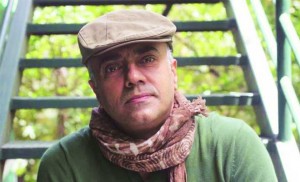 As a child subjected to the hundreds of mid-film advertisments on television, I remember the face of Rajit Kapur (and not Rajat Kapoor, the actor-director) constantly haunting me in the OCM (suitings) ad and that annoying jingle. Soon, though, the face was given gravitas when I noticed him as tapori Aamir Khan’s educated brother (and villain Sharad Saxena’s “chamcha” accountant) in Vikram Bhatt’s Ghulam. Many will forever associate him with the eponymous Bengali detective Byomkesh Bakshi, who he enacted with distinction in Basu Chatterjee’s immensely popular ‘90s TV series. He, of course, went on to do a handful of bit roles in many Hindi movies over the years – none of which I really remembered till I noticed him in ‘The Threshold’, a lovely little Indian film that played at the Mumbai Film Festival last year. As a gruff patriarchal North Indian husband, who has recently retired to live in the mountains with his wife (Neena Gupta), he delivers one of the most real and heartbreaking performances I’ve ever seen. The film is a chamber piece and a relationship drama, based in a cabin, but Kapur is fantastic as a man about to be left by his wife in their twilight years. This film may never be commercially released, but this is Kapur’s only full-fledged on-screen role I will (thankfully) remember with fondness and wet eyes. He is, again, a very respectable theatre veteran, and even recently introduced and hosted the legendary Zuben Mehta and Italian tenor Andre Bocelli on stage at their concert in Brabourne recently. His diction is precise and unmistakable, and a clear result of many years of remarkably nuanced stage performances.
As a child subjected to the hundreds of mid-film advertisments on television, I remember the face of Rajit Kapur (and not Rajat Kapoor, the actor-director) constantly haunting me in the OCM (suitings) ad and that annoying jingle. Soon, though, the face was given gravitas when I noticed him as tapori Aamir Khan’s educated brother (and villain Sharad Saxena’s “chamcha” accountant) in Vikram Bhatt’s Ghulam. Many will forever associate him with the eponymous Bengali detective Byomkesh Bakshi, who he enacted with distinction in Basu Chatterjee’s immensely popular ‘90s TV series. He, of course, went on to do a handful of bit roles in many Hindi movies over the years – none of which I really remembered till I noticed him in ‘The Threshold’, a lovely little Indian film that played at the Mumbai Film Festival last year. As a gruff patriarchal North Indian husband, who has recently retired to live in the mountains with his wife (Neena Gupta), he delivers one of the most real and heartbreaking performances I’ve ever seen. The film is a chamber piece and a relationship drama, based in a cabin, but Kapur is fantastic as a man about to be left by his wife in their twilight years. This film may never be commercially released, but this is Kapur’s only full-fledged on-screen role I will (thankfully) remember with fondness and wet eyes. He is, again, a very respectable theatre veteran, and even recently introduced and hosted the legendary Zuben Mehta and Italian tenor Andre Bocelli on stage at their concert in Brabourne recently. His diction is precise and unmistakable, and a clear result of many years of remarkably nuanced stage performances.
VIJAY RAAZ
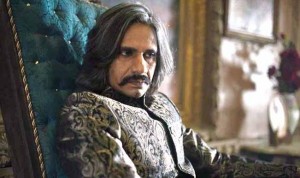 The NSD graduate first made an indelible mark as the wedding planning hustler P.K. Dubey in Mira Nair’s iconic film, Monsoon Wedding. His grasp of lower middle-class ‘bindaas’ traits burdened with an ambitious heart is remarkable, and he seems to understand – and has fully exploited – the inherent comic presence of his unconventional facial features through unique self-depreciative mannerisms and dialects. He played another role for the ages in ‘Delhi Belly’, as the frustrated gangster saddled with an incompetent team and terrible situations. But he truly fulfilled his potential in his lead role in Rajat Kapoor’s national-award winning Raghu Romeo, and later in his own directorial debut ‘Kya Dilli Kya Lahore’ opposite the next actor on this list…
The NSD graduate first made an indelible mark as the wedding planning hustler P.K. Dubey in Mira Nair’s iconic film, Monsoon Wedding. His grasp of lower middle-class ‘bindaas’ traits burdened with an ambitious heart is remarkable, and he seems to understand – and has fully exploited – the inherent comic presence of his unconventional facial features through unique self-depreciative mannerisms and dialects. He played another role for the ages in ‘Delhi Belly’, as the frustrated gangster saddled with an incompetent team and terrible situations. But he truly fulfilled his potential in his lead role in Rajat Kapoor’s national-award winning Raghu Romeo, and later in his own directorial debut ‘Kya Dilli Kya Lahore’ opposite the next actor on this list…
MANU RISHI
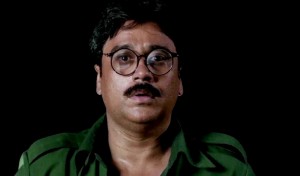 Another immensely under-explored talent, another theatre veteran. We all need to see more of Manu Rishi, and not just as a dialogue writer. A regular early fixture in Rajat Kapoor films (Raghu Romeo, Mithya), Rishi truly captured imaginations only in Dibakar Bannerjee’s outrageous Oye Lucky! Lucky Oye! as Abhay Deol’s perpetually edgy partner-in-crime, Bangali. He appeared in quick succession as a small-town bungling crook in the satire, Phas Gaya Re Obama, before disappearing for a while and doing a blink-and-miss role in Rajat Kapoor’s wonderful ‘Aankhon Dekhi.’ Again, he reminded me of what could have been (and what still can be) when he excelled opposite Vijay Raaz in ‘Kya Dilli Kya Lahore’ – as a good-hearted Indian army cook trapped in a cabin with a Pakistani soldier, ruminating on war and life with genuine experience.
Another immensely under-explored talent, another theatre veteran. We all need to see more of Manu Rishi, and not just as a dialogue writer. A regular early fixture in Rajat Kapoor films (Raghu Romeo, Mithya), Rishi truly captured imaginations only in Dibakar Bannerjee’s outrageous Oye Lucky! Lucky Oye! as Abhay Deol’s perpetually edgy partner-in-crime, Bangali. He appeared in quick succession as a small-town bungling crook in the satire, Phas Gaya Re Obama, before disappearing for a while and doing a blink-and-miss role in Rajat Kapoor’s wonderful ‘Aankhon Dekhi.’ Again, he reminded me of what could have been (and what still can be) when he excelled opposite Vijay Raaz in ‘Kya Dilli Kya Lahore’ – as a good-hearted Indian army cook trapped in a cabin with a Pakistani soldier, ruminating on war and life with genuine experience.
BRIJENDRA KALA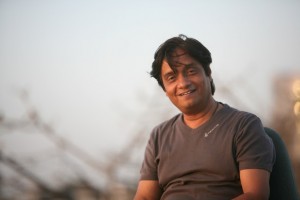
It speaks volumes that the fast-talking, hyperactive actor only got noticed in the sleeper hit ‘Paan Singh Tomar’ as the intimidated reporter interviewing the titular dacoit and ex-athlete (Irrfan Khan). By then, however, he had already appeared in brief impressionable roles in Jab We Met, Raghu Romeo, Mithya, Mere Brother Ki Dulhan, Dasvidaniya, Karthik Calling Karthik and Chalo Dilli. Originally part of the same Rajat Kapoor-Vinay Pathak gang of talents, Kala continued “teasing” with his fleeting roles – in Aankhon Dekhi, Jolly LLB, PK, Youngistaan and Guddu Rangeela. He often appears in films with Sanjay Mishra, or as specialist character actors who absolutely must make an impression with the single scene they have. He has made it an art of sorts, though I would love to see him in a full-blooded, meaty role that goes beyond stereotyping and testing him the way mainstream cinema has done.
NAMIT DAS
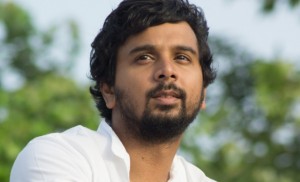 After playing a vaguely racist and hilarious South Indian software engineer in the very watchable cult comedy, ‘The President Is Coming’, Das became semi-famous with his role as Ranbir Kapoor’s best friend in ‘Wake Up Sid.’ He hasn’t done much after that, with noticeable but unrewarding turns in ‘Ghanchakkar’ and ‘Lafangey Parindey’. As the befuddled beta-male-son-in-law type in ‘Aankhon Dekhi’ and a regular fixture in many ad films (including the latest Flipkart series with Rajesh Sharma and Amol Palekar), Das continues to occupy the sidelines of the industry. Hopefully, soon, a writer or director will see more than just a recognisable supporting face in him. And hopefully, his expertise spreads beyond the stage into Indian living rooms.
After playing a vaguely racist and hilarious South Indian software engineer in the very watchable cult comedy, ‘The President Is Coming’, Das became semi-famous with his role as Ranbir Kapoor’s best friend in ‘Wake Up Sid.’ He hasn’t done much after that, with noticeable but unrewarding turns in ‘Ghanchakkar’ and ‘Lafangey Parindey’. As the befuddled beta-male-son-in-law type in ‘Aankhon Dekhi’ and a regular fixture in many ad films (including the latest Flipkart series with Rajesh Sharma and Amol Palekar), Das continues to occupy the sidelines of the industry. Hopefully, soon, a writer or director will see more than just a recognisable supporting face in him. And hopefully, his expertise spreads beyond the stage into Indian living rooms.
SPECIAL MENTIONS:
Rajesh Sharma, Vipin Sharma, Anil Mange, Yogendra Tiku, Manoj Pahwa, Amole Gupte, Yashpal Sharma, Ravi Kishan, Amit Sial, Virendra Saxena, Amit Sadh and Parikshit Sahni

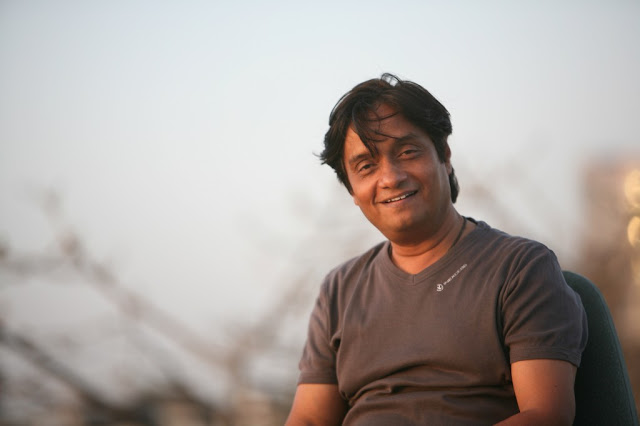



Leave A Comment
You must be logged in to post a comment.